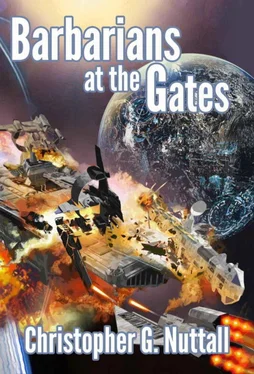Tiffany joined him for the speeches. Very few of them, Marius noted, had anything to do with either Tiffany or himself. The speakers seemed more determined to offer florid tributes to themselves and the great wisdom of the Senate in dealing with rebels, traitors and domestic enemies. Their prattling was giving him a headache by the time the speaking was finally over and they were allowed to leave.
Tiffany pulled him into a black aircar, festooned with bunting, and ordered the autopilot to take them to the Grand Hotel.
Marius stared at his bride, feeling—again—the odd surge of protectiveness. Tiffany’s eyes were bright, too bright. He recognized the symptoms of tiredness and stress and wondered how many of them he was showing. He’d once commanded during a battle that had lasted for two days, but that had been years ago, when he’d been a younger man.
“I’m sorry,” he said, and meant it.
“Don’t be,” Tiffany said. She reached for him and placed her hand on his heart. “It wasn’t your fault.”
She snorted then and started to undo her dress. “I think someone designed this purposely to be uncomfortable so we’d want to get out of them quickly.”
Marius stopped her. “You don’t have to…”
“Yes, I do,” Tiffany said. Her eyes narrowed. “The wedding has to be consummated, doesn’t it?”
Marius hesitated, unsure of what to say. In an aircar, of all places?
“Besides, everyone was cheerfully predicting that the marriage would fall apart within a week. I thought we might try to make it last ten days.”
“Oh,” Marius said, and then realized that he was being teased. “Should we try for a month, or is that too ambitious?”
Tiffany laughed and reached for him. By the time the aircar reached the Grand Hotel’s honeymoon suite and landed outside the private entrance, they were too occupied to notice until the aircar’s autopilot hooted at them. Marius picked Tiffany up and carried her into the honeymoon suite, laying her down on the bed. A moment later, as the aircar departed into the night, he started kissing her again.
Afterwards, they toasted each other with champagne before returning to bed. As he drifted off to sleep, holding her in his arms, Marius allowed himself one final thought.
Perhaps marriage wouldn’t be so bad after all.
The Senate’s security levels often leave something to be desired. While the Senators themselves are meant to be above suspicion, they are often quite willing to leak sensitive data to the media for their own reasons, Even if the Senators themselves do not leak the data, they have a habit of informing their subordinates, who might happily leak the information for their own reasons…
…What this means, in effect, is that anything told to the Senate may not remain secret for very long…
-
An Irreverent Guide to the Federation , 4000 A.D.
Earth, Sol System, 4095
Marius whistled cheerfully as he was escorted by one of the Senatorial aides into the classified briefing room just outside the Senate Hall. Based on five days of marriage, part of him insisted that he would enjoy it all, even though they barely knew one another and there was no time for a proper honeymoon. They’d spent four days in the Honeymoon Suite, with no one intruding on their privacy, and a fifth day visiting the underwater grottos at the North Pole. Marius knew from history that the North Pole had once had an icecap, but it had melted down long ago, causing the sea level to rise dramatically. That ecological disaster had had a major impact on humanity’s determination to move out into space.
“Watch your back,” Tiffany had warned him when they’d parted. “You may be High Society now, legally, but not all of the young bucks and blades are going to accept you.”
Marius had taken her words to heart when he’d visited the Admiralty, but no one there had personally doubted him. A few old women of both genders had raised objections to his operational plans—at least the plans he’d chosen to share with them—and it had taken hours of arguing to convince them to accept the plans without major modifications. He had to admit that they had a point—the plans he’d shared with them were not particularly imaginative and therefore they would be predictable—but that was part of the point. If anything leaked back to Admiral Justinian or the other warlords, they’d be misled.
Or so he hoped.
He was awed at the level of firepower the Federation had created. Once the expanded training camps had finished turning out the next few graduating classes, it would be possible to man and deploy new construction very quickly. A few more weeks to work up the ships, and the Federation Navy would hold a decisive advantage over the warlords.
Of course, if the warlords did manage to work together, the advantage wouldn’t be as decisive as Marius hoped, but it should suffice to weaken them. Once Admiral Justinian was defeated, the other warlords could be crushed one by one. They lacked the firepower to be a strategic threat. The real danger lay beyond the Rim.
“The room is now sealed,” Grand Senator Brockington said. “The Senate Subcommittee on the Conduct of the War is now in session.”
Marius nodded. The Leader of the Conservative Faction had been one of the few senior Senators to offer congratulations to Marius and Tiffany. Marius had had the odd feeling that he’d meant every word, unlike some of the others, who’d acted like Marius smelled bad.
“Thank you, Senator,” Grand Senator Alison Wallisch said. “There are many questions that need to be raised.”
Marius sighed. The Leader of the Socialist Faction hadn’t offered sincere congratulations to the newlyweds, but Marius had already deduced that there were limits to her socialism. The Socialist Faction might insist on gifting alien races with the benefits of human technology, yet doing so also had the effect of permanently neutralizing any threat those aliens might pose to humanity. Anything they might create for themselves was automatically branded as inferior.
He sat back and watched as the Senators sparred, sometimes calling on Admiral Fallon—the CO of Earth’s defense network—to answer specific questions. It seemed that there were accusations of war profiteering, although he couldn’t tell if the Senators were annoyed over the war profiteering itself or if they were merely upset that they weren’t skimming off the cream themselves. Judging from the messages he’d received from Professor Kratman, Marius would have bet good money that every Senator was profiting from the war, although it was an open question how long they could do so before there was an economic collapse. The Federation’s economy had been badly weakened by the war.
Other questions focused on operations against other warlords. General Williamston, who had carved out a vest-pocket kingdom of four stars and nine planets, had been defeated in a short and bloody campaign. The General had somehow failed to realize that his little Kingdom didn’t have the firepower to prevent the Federation Navy from sending a squadron of superdreadnaughts through the Asimov Point and punching out his orbital fortresses, or that the Senate was desperate and ruthless enough to order planetary bombardment as a response to his refusal to surrender.
Marius hadn’t been involved in that campaign—he’d been watching Admiral Justinian—but he’d been sickened by the reports. The Federation Navy hadn’t quite bombed the planet back to the Stone Age, yet that had only been avoided because the General’s subordinates shot him in the head and surrendered unconditionally.
That example boded ill for the worlds Admiral Justinian had brought under his banner. Some worlds had followed him willingly, but others—like Jefferson—hadn’t been given much of a choice in the matter. But that might not matter to the Senate, not when Jefferson was a money-maker for whoever owned the system. They’d be happy to remove the old government, put a Federation Governor in place and milk it for all that it was worth, along with a secret police to ferret out all independence movements and revisionists.
Читать дальше












